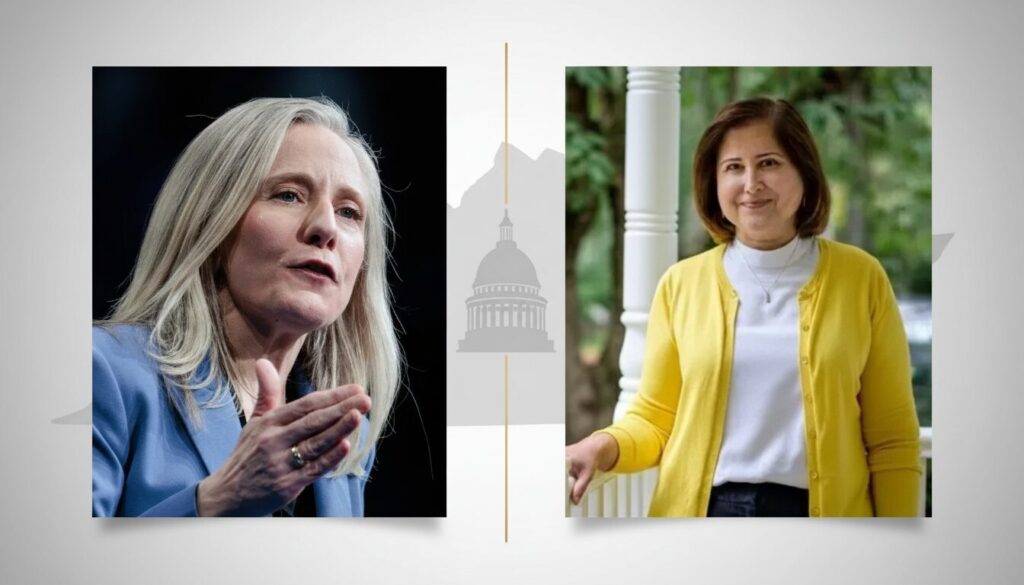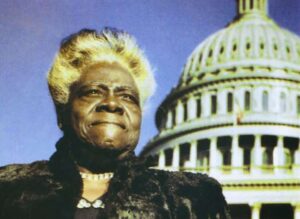Major Takeaways
Virginia makes history with women leading both top executive offices, including Ghazala Hashmi as lieutenant governor.
Hashmi’s leadership marks a major step toward representation, equity, and progressive policymaking in the Commonwealth.
The women-led government signals a shift toward inclusivity, diversity, and new opportunities for future generations of Virginians.
Virginia’s Women Take Charge in 2025: Powerful Ways Ghazala Hashmi and the Governor Are Transforming Leadership
For the first time in Virginia’s long political history, the state is now led by women at its highest levels of government. With a Democratic governor and newly elected Lieutenant Governor Ghazala Hashmi, the Commonwealth has entered a new chapter that reflects the evolving face of leadership in America.
This moment is not just a headline; it is a transformation decades in the making. Women in Virginia have long been organizing, voting, and leading behind the scenes. Now, they are at the center of power, representing communities that once had little voice in shaping the future. For Urban City readers across the nation, this moment speaks to more than state politics. It is a reflection of how representation, diversity, and leadership are reshaping American democracy.
A Historic Milestone for Virginia
Ghazala Hashmi’s election as Lieutenant Governor marks a major milestone in Virginia’s political evolution. Born in Hyderabad, India, Hashmi immigrated to the United States as a young woman, eventually earning her PhD in English from Emory University. Before entering politics, she spent years in higher education, serving as an administrator and professor in Richmond.
Her story is uniquely American—an immigrant who rose from educator to state senator and now to one of the highest offices in Virginia. As the first Muslim woman and one of the first Indian Americans ever elected to statewide office in the Commonwealth, Hashmi’s achievement symbolizes the shifting demographics and priorities of Virginia’s electorate.
But Hashmi’s victory is not just symbolic. It comes at a time when Virginia is becoming one of the most progressive states in the South, a region long associated with conservative politics. Her win, alongside a Democratic governor, represents a clear signal that voters want inclusion, equality, and policies that reflect the real challenges of modern life including healthcare, education, and the economy.
A Women Led Government
Virginia’s leadership team now reflects a government that is both gender diverse and policy forward. With a woman serving as governor and Ghazala Hashmi as lieutenant governor, the Commonwealth has entered uncharted territory.
This is the first time in Virginia’s history that the two highest offices are occupied by women. It is a moment of pride not only for the state but also for women across America who see this as evidence that barriers are breaking at the highest levels of power.
While the governor focuses on steering the state’s policy agenda, Hashmi plays a crucial role in the Senate, where she presides and casts tie breaking votes. Her position gives her influence over legislation that directly affects millions of Virginians. Her leadership style, focused, collaborative, and empathetic, has already earned praise from both supporters and some across the political aisle.
Why This Matters for Women Across Virginia
Representation is not just about visibility; it is about power, voice, and the ability to make change. For women across Virginia, having two women at the top of the state’s executive branch sends a message of empowerment.
From Richmond to Roanoke, women are watching closely. In communities that have historically struggled with wage inequality, childcare access, or healthcare challenges, there is a renewed sense of optimism. This leadership shift could translate into tangible policies that make daily life better for women and families.
Ghazala Hashmi has made education and family support central to her platform. Her career as an educator informs her advocacy for accessible education, better funding for schools, and support for teachers. She has also spoken passionately about protecting reproductive rights and expanding access to healthcare.
For many women in Virginia, especially women of color and working mothers, these policies are not abstract. They are personal. The promise of a government that listens and acts on these issues brings hope that Virginia will continue to evolve into a more equitable place for all.
Changing the Political Landscape
The rise of women leaders in Virginia also has deep political implications. Historically, Virginia leaned conservative for much of the 20th century, dominated by Republican politics and traditional power structures. In recent decades, however, demographic changes, education growth, and urban expansion have transformed the political map.
Today, Northern Virginia’s booming tech economy, Richmond’s progressive academic and creative communities, and Hampton Roads’ diverse population have shifted the state’s political balance. The growing influence of younger voters and minority communities has created an electorate that looks and thinks differently than the Virginia of old.
Hashmi’s win reflects this broader transformation. Her success in a state that once resisted change highlights how far Virginia has come and how the future of American politics increasingly depends on diverse voices stepping into leadership.
A Role Model for the Next Generation
For young women and girls, especially those from immigrant or minority backgrounds, Ghazala Hashmi represents what is possible when perseverance meets purpose. She embodies the idea that leadership is not limited by race, religion, or origin.
Across Virginia schools, community groups, and college campuses, educators are already using her story to inspire civic engagement and leadership. It reminds students that the halls of power are not closed to them, that participation matters, and that their voices can shape history.
This symbolic power has real impact. When girls see someone who looks like them leading, it changes what they imagine for their own futures. That ripple effect extends far beyond politics it influences education, entrepreneurship, and community activism.
What It Means for Virginians as a Whole
For all Virginians, regardless of gender or background, the rise of women in state leadership signals a new kind of governance that is pragmatic, compassionate, and inclusive.
It means a focus on issues that affect everyday life. Expect more conversations about affordable healthcare, mental health access, small business growth, and infrastructure that connects communities rather than divides them.
It also means more investment in education, from pre K to college. Hashmi has long argued that education is not just an academic issue it’s an economic one. A strong education system creates opportunity, attracts business, and strengthens communities.
Virginians could also see expanded efforts to protect the environment, as both leaders have spoken about sustainability and preparing the state for climate change impacts, including coastal flooding and energy reform.
National Implications: A Mirror for America
What is happening in Virginia may soon reflect a broader national trend. Across the United States, women are winning elections, leading statehouses, and transforming politics at every level.
The rise of women in leadership from Michigan Governor Gretchen Whitmer to New York Governor Kathy Hochul demonstrates that voters are embracing competence and empathy over traditional political gamesmanship. Virginia joins this growing list of states redefining what leadership looks like.
Hashmi’s election also highlights America’s changing demographics and cultural openness. Her success challenges outdated ideas about who can represent Americans, reminding the nation that diversity is not just a buzzword it is a strength.
As the national conversation around representation continues, Virginia’s model could influence future elections across the country. Other states may look to replicate the Commonwealth’s approach to inclusivity and governance.
Women’s Empowerment in Policy and Practice
The symbolism of having women in leadership is powerful, but what truly matters is how that power is used. Both the governor and lieutenant governor are expected to advance policies that directly impact women and families.
Areas likely to see renewed focus include workforce development, efforts to close gender pay gaps, and creating pathways for women in tech, trade, and entrepreneurship. Protecting access to healthcare and reproductive choices amid shifting national laws remains a top priority. Investments in affordable childcare, paid family leave, and programs that help working parents are also expected to grow.
Education reform will continue to play a major role, with attention on teacher shortages, raising pay, and expanding early learning opportunities. Public safety and mental health reform will likely see renewed emphasis, as leaders seek community centered approaches to reduce violence and strengthen neighborhoods.
The Ripple Effect Beyond Politics
The emergence of women leaders has a ripple effect across sectors. Businesses, nonprofits, and community organizations often mirror the values of their state leadership.
In Virginia, that could mean more investment in women owned businesses, greater funding for social programs, and increased collaboration between state government and grassroots groups.
Culturally, this leadership shift also invites new conversations about identity and belonging. For immigrant families, Hashmi’s rise sends a message of acceptance. For younger generations, it shows that civic participation can yield real change.
Challenges Ahead
Despite the optimism, Virginia’s new leadership will face significant challenges. The state remains politically divided, with rural regions often leaning conservative and urban centers supporting progressive agendas.
Bridging those divides will require diplomacy and patience. Economic disparities between regions, ongoing debates about gun safety, and the complexities of energy transition will test the administration’s ability to find common ground.
However, both women have demonstrated skill in collaboration and coalition building. Hashmi’s academic background and legislative experience give her the tools to navigate complex issues while maintaining civility and respect.
A New Vision of Leadership
What stands out most about Virginia’s new leadership is its tone. It represents a move away from politics as spectacle and toward governance that values empathy, service, and results.
The focus is not on partisanship but on purpose. This shift could help restore public trust in government at a time when many Americans feel disconnected from their leaders.
For Urban City readers, this development is a reminder that representation matters and that state politics are just as vital as national ones. It’s at the state level where education funding, healthcare expansion, and housing policy take shape.
The Broader Meaning for America
Virginia’s transformation could be a preview of the future of American politics. As more women and people of color step into leadership roles, states are becoming laboratories for inclusion and innovation.
The country is watching closely. In a political climate often divided by ideology, Virginia’s new leadership offers a different story one rooted in collaboration, competence, and compassion.
This does not mean every problem will be solved overnight. But it does mean that the values guiding decision making are shifting. Leadership now looks more like the people it serves.
Conclusion: A New Day for Virginia and Beyond
Virginia’s new women led government, with Ghazala Hashmi as lieutenant governor and a Democratic governor at the helm, is more than a political milestone it is a statement of progress.
It reflects decades of advocacy, voting, and community work by women who demanded representation and equity. It shows that when doors open, new voices bring new ideas, and those ideas can change a state.
For all Virginians, this moment is a chance to envision a future where diversity is celebrated, where leadership serves the people, and where progress is not a slogan but a lived reality.
And for the nation, Virginia stands as proof that change is possible when people believe in inclusion, empathy, and the power of leadership that reflects the world we live in.












